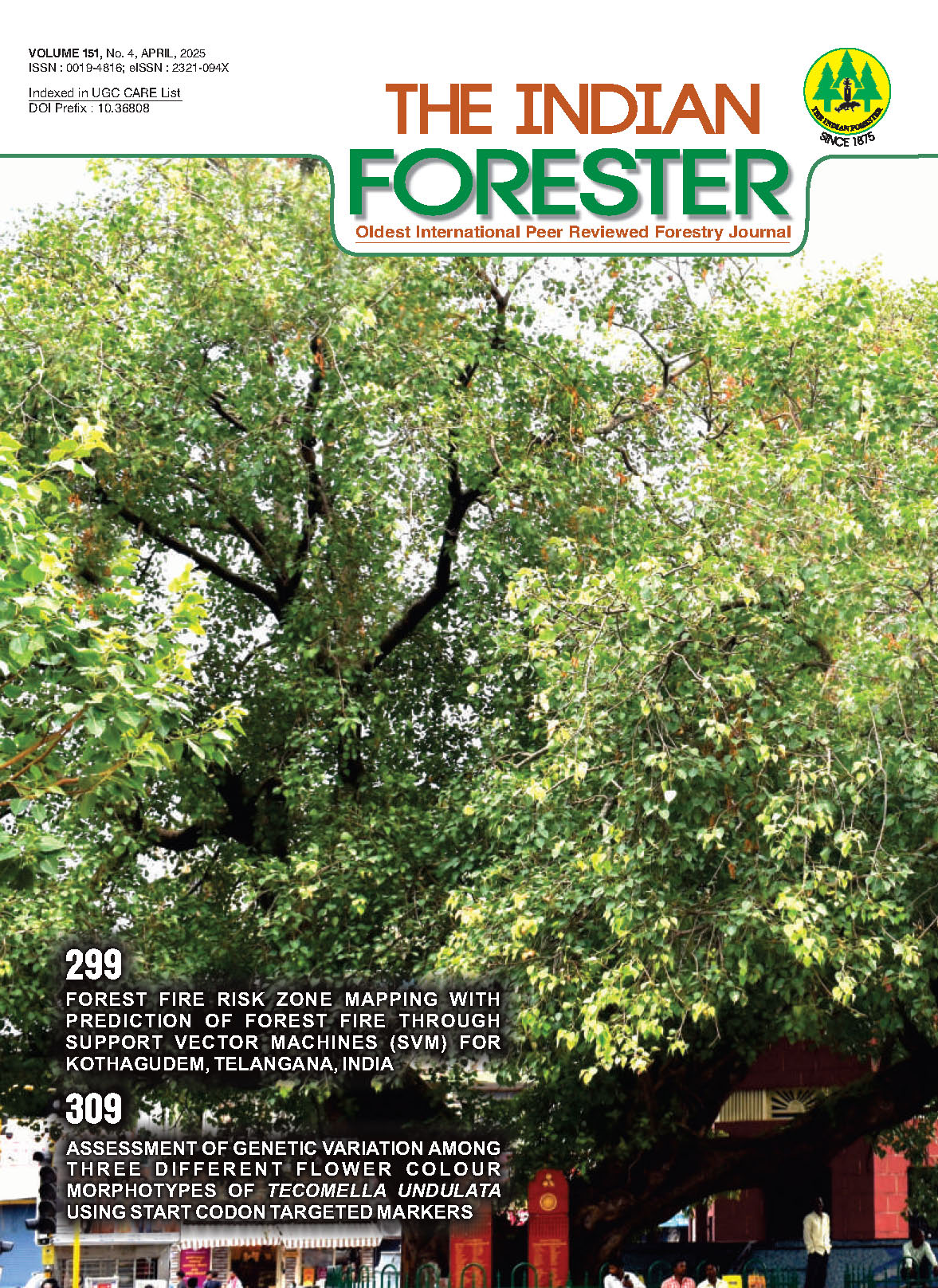New additions to the Lichen biota of Jammu and Kashmir, India
DOI:
https://doi.org/10.36808/if/2025/v151i4/170590Keywords:
Bhaderwah, Lichen, Biota, Jammu and Kashmir, Doda.Abstract
The present study, carried out on Lichen biota in the sub-alpine and alpine regions of Bhaderwah, Jammu and Kashmir has revealed 15 species belonging to 15 genera and 09 families as new distributional records. All the species are appended herewith a brief description, illustrations together with notes on their Distribution and Ecology.
References
Awasthi D.D. (2007). A Compendium of the Macrolichens from India, Nepal and Sri Lanka. Bishen Singh Mahendra Pal Singh, Dehradun.DOI:10.1017/S0024282908009146 DOI: https://doi.org/10.1017/S0024282908009146
Barkman J.J. (1958). Phytosociology and ecology of cryptogemic epiphytes. Van Gorcum, Assen, Nether lands.
Brodo I.M. (1974). Substrate ecology. In: The lichens (Eds. V. Ahmadjian and M.E. Hale). Academic Press, New York. 401441.
Dhar B.L. (1972). Geology of the area in and around Kishtwar, Kashmir. Ph. D. Thesis submitted to the University of Jammu, Jammu, J&K, India.
Didwal R.S. (1975). Peterological studies of Pre-Cambrian of the Himalayas in the Doda District of Jammu and Kashmir State. Ph. D. Thesis submitted to the University of Jammu, Jammu, J&K, India.
Gansser A. (1964). Geology of Himalayas. Interscience Publishers, Johnwiley and Sons Ltd., London, New York, Sedney. 289.
Goni R. and Sharma N. (2015). Additions to lichen flora of Jammu and Kashmir, India. Tropical Plant Research, 2(2): 78–81.
Goni R., Raina A.K.P., Magotra R. and Sharma N. (2015). Lichen flora of Jammu and Kashmir State, India: An updated Checklist. Tropical Plant Research, 2(1): 64-71.
Gupta H. (2021). Assessment of live tree biomass and carbon content along the altitudinal gradient in Neeru Range of Bhaderwah forest. M.Phill. dissertation. University of Jammu (J&K).
Gustafsson L., Fiskes O., A, Ingellog, T., Peterson B. and Thor G. (1992). Factors of importance to some lichen species of decidous broad-leaved woods in southern Sweden. Lichenologist, 24: 225-266. DOI: https://doi.org/10.1017/S0024282992000367
Holien H. (1998). Lichen in spruce forest stands of different successional stages in Central Norway with emphasis on diversity and old growth species. Nova Hedwigia, 66: 238-324. DOI: https://doi.org/10.1127/nova.hedwigia/66/1998/283
Hyvarinen M., Holonen P. and Kanppi M. (1992). Influence of stand age and structure on the epiphytic lichen vegetation in the middle-boreal forest of Finland. Lichenologist, 24:165-180. DOI: https://doi.org/10.1017/S0024282900500073
Kapoor H.M. (1964). General report, Records of the Geological Survey of India. 96: 428.
Khajuria S.S. (1984). Study of Chinta Granite Bhaderwah, Kashmir Himalayas. M. Phill. Dissertation submitted to the University of Jammu, Jammu, J&K, India.
Khan S.I., Raina A.K. and Upreti D.K. (2010). Enumeration & distribution of lichens in Surankote, District Poonch, J&K (India). Environment Conservation Journal, 11(3): 27-31. https://doi.org/10.36953/ECJ.2010.110306 DOI: https://doi.org/10.36953/ECJ.2010.110306
Khare R., Upreti D.K., Haq M.U. and Behera B.C. (2020). Diversity of Lichens in Jammu and Kashmir State In: Dar, G.H. & A.A. Khuroo (eds.). Biodiversity of the Himalaya: Jammu and Kashmir State. Springer, Singapore, 343-377; DOI:10.1007/ 978-981-32-9174-4_15 DOI: https://doi.org/10.1007/978-981-32-9174-4_15
Kumar V., Sharma Y.P., Joseph S., Ngangom R.K. and Nayaka S. (2021). Additions to the lichenized and lichenicolous fungi of Jammu & Kashmir from Kishtwar High Altitude National Park. Journal of Threatened Taxa, 13(12): 19799–19807; DOI:10.11609/jott.7312.13.12.19799-19807 DOI: https://doi.org/10.11609/jott.7312.13.12.19799-19807
Loppi S., Bonini I. and De Dominicis V. (1999). Epiphytic lichens and bryophytes of forest ecosystems in Tuscany (central Italy). Cryptogamie, Mycology, 20(2): 127-135. DOI: https://doi.org/10.1016/S0181-1584(99)80016-5
Rai H., Khare R., Upreti D.K. and Ahti T. (2014). Terricolous Lichens of India: Taxonomic keys and description. In: Rai H&Upreti DK (eds) Terricolous lichens in India, Morphotaxonomic studies, Springer, New York, 2: 17–294.DOI:10.1007/978-1-4939-0360-3_2 DOI: https://doi.org/10.1007/978-1-4939-0360-3_2
Selva S.B. (1994). Lichen diversity and stand continuity in the northern Hardwoods and spuree fir forest of northern New England and western new Brunswiek. Bryologist, 97: 424-429. DOI: https://doi.org/10.2307/3243911
Sharma S.K. (1981). Peterological studies of south eastern part of Kaplas Granite Masif. Doda District, Kashmir Himalayas. Unpublished Ph.D thesis submitted to University of Jammu, Jammu.
Sharma V.P., Chaturvedi R.K. and Sundaran (1973). An account of Stratigraphy and structure of Doda, Bhaderwah – Basantgarh region Jammu Himalayas. Seminar on Geodynamics of the Himalayan region. Hydrabad, 110-121.
Sheikh M.A., Raina A.K. and Upreti D.K. (2006). Lichen Diversity inJammu and Kashmir, India. Geophytology, 36(1&2): 69–85.
Sheikh M.A., Raina A.K. and Upreti D.K. (2009). Lichen flora of Surinsar-Mansar wildlife sanctuary, J&K. Journal of Applied and Natural Science, 1(1): 79–81. DOI: https://doi.org/10.31018/jans.v1i1.43
Singh K.P. and Sinha G.P. (2010). Indian Lichen: An Annotated Checklist. Botanical Survey of India, Kolkata, India.
Solan S., Mehta K.A. and Magotra R. (2010). A catalogue of lichens of Ramnagar Wildlife Sanctuary, (J&K). Phytotaxonomy, 10: 134–138.
Thakur V.C., Rautela P. and Jafaruddin M. (1995). Normal faults in Panjal Thrust Zone in lesser Himalaya and between the Higher Himalaya Crystallines and Chamba sequence in Kashmir Himalayas, India. Proceedings of the Indian Academy of Sciences, 104(3): 499-508. DOI: https://doi.org/10.1007/BF02843412
Wadia D.N. (1931). The syntexis of north western Himalayas. Its rocks tectonic and Orogeny. Records of the Geological Survey of India, 65(2): 189-220.
Downloads
Downloads
Published
How to Cite
Issue
Section
License
Unless otherwise stated, copyright or similar rights in all materials presented on the site, including graphical images, are owned by Indian Forester.





